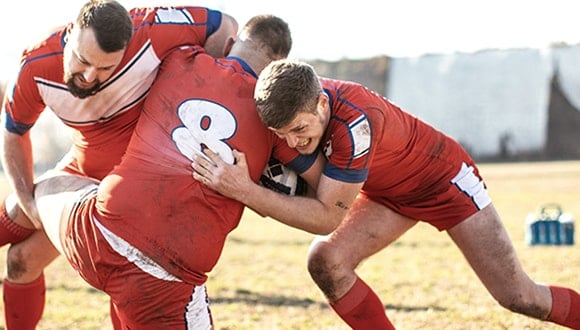Concussion in sport
Sports concussions are on the rise and can have serious long-term effects.
Charmaine Yabsley
October 2018
Many parents have stood on the sideline watching their child play sport and winced every time they’ve had a knock or blow. And you only have to watch a rugby league, union or AFL game to see that head injuries are a real risk.
According to the Australian Medical Association, the rate of sport-related concussion has grown, with the number of players hospitalised with concussion increasing by 38.9% in a 9-year period.
It’s not just its immediate effects that are concerning, serious long-term problems are now more widely recognised.

What is concussion?
Concussion is a head injury that may be caused by either a direct or indirect blow to the head, face, neck or body.
Short term, a person who’s concussed may experience neurological impairment like confusion and symptoms like dizziness and headaches, over several days.
Recognising the signs is important because getting a diagnosis, treatment and advice from a medical professional can help to prevent further injury. Here’s what to look out for:
- injury from a knock to the head or body (which may affect the head)
- unconsciousness
- difficulty walking or balancing
- neck pain or tenderness
- double vision
- weakness or tingling/burning in arms or legs
- severe or increasing headache
- seizure or convulsions
- vomiting
- increasingly restless, agitated or combative.
What are the dangers of concussion?
Dr Fatima Nasrallah, senior research fellow at Queensland Brain Institute, says we’re learning that the more concussions we get, the more likely long-term effects are.
“While the main issue is the long-term consequences of concussion and its relationship with the development of early onset dementia and dementia-like symptoms, management of the early symptoms following a concussion is what appears to be crucial.”
Recent studies of NFL players in the US have highlighted potential long-term effects of repetitive concussions, including a report that found traumatic brain injury increases the risk of dementia.
Research from the University of Toronto also found a link between concussion and an increased risk of suicide. Other long-term effects can include memory and concentration problems, depression, anxiety and irritability.
If you suspect concussion, what should you do?
The person should be taken to a GP or hospital emergency department.
People with suspected concussion shouldn’t:
- be left alone for the first 1-2 hours
- drink alcohol
- use recreational ornsedative prescription drugs
- be sent home by themselves; they need to be with a carer
- drive until cleared to do so by a healthcare professional.
Mental and physical rest is important for recovering from concussion. Management may include a doctor running tests and assessing how long the patient should rest.
Sports Medicine Australia has a pocket guide for concussion diagnosis and post-concussion treatment that can be used at sports clubs.
Related articles
MIGRAINES: MORE THAN A BAD HEADACHE
15% of Australians regularly experience migraines. But what are they and how are they treated?
MYTHBUSTING: 6 FITNESS CLAIMS PUT TO THE TEST
We examine common claims about exercise to sort the fact from the fiction.
IS RUNNING GOOD FOR YOU?
Depending on who you ask, running will either add years to your life or age you prematurely. Here are the facts.
KNEE REPLACEMENT: WHAT YOU NEED TO KNOW
A knee replacement can be a daunting prospect, but it could give you a new lease on life.